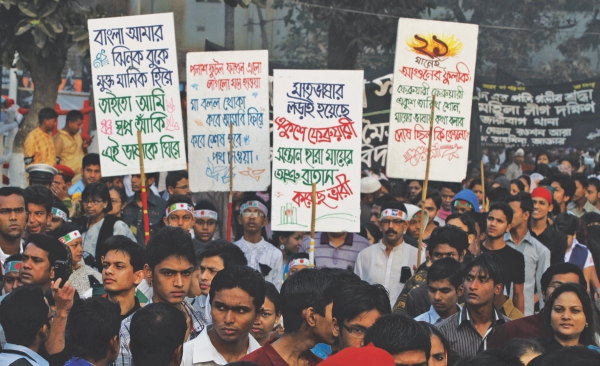| Home - Back Issues - The Team - Contact Us |
 |
| Volume 12 |Issue 02| January 11, 2013 | |
|
|
Musings
The Language of Speech Jalal Uddin Khan Recently there has been a lot of talk concerning the im/purity of the national tongue and the lack of the practice of standard Bangla in speaking. Majority of Bangladeshis, regardless of how formally educated and how well placed in the station of life they are–be they company managers, bankers, civil servants, or college/university professors/instructors—are equally weak both in writing and speaking. Well, writing can at least be attempted to be improved through a number of drafts and revisions, which is not possible in the case of speaking. The pronunciation, choice of words and the syntax of most Bangladeshis suggest that their Bangla, written or spoken, is still at the level of ancient prakrit or local/tribal dialect. Unfortunately, instead of these areas, modern criticism is directed towards the general mixing of Bangla with some common English words and expressions. To me, that is not as objectionable as the rape of the language by utter mispronunciation, be it Bangla or English. Wrong pronunciation and wrong structure of a sentence, sometimes full of empty and flattering epithets and adjectives, out of cheap political motivation, are more reprehensible and unacceptable than the natural or fashionable fusion of words from two or more languages. If the accent and pronunciation are clear and correct with due, diligent and adequate attention to vowels and syllables and spelling, no mixing can ever sound that bad or hard. In fact, mixing can become a nice productive fusion if that is done carefully, blending the words from different languages. Improper, imperfect and accented pronunciation together with scanty attention to spelling, depending on where the speaker grew up—Sylhet, Barisal, Noakhali, Chittagong, for instance—is detrimental to the beauty and quality of the language of speech. Except a rare few in the media or the field of arts and culture, how many Bangla-speaking people, no matter how highly educated they are and how high the positions they occupy, let alone the ordinary masses, can actually spell and pronounce the letters of the Bengali alphabet itself?
Without these fundamentals, speech cannot be expected to improve. It is the responsibility of teachers/instructors at all levels beginning with the primary to teach the basics of accent, pronunciation and spelling. When those very teachers/instructors themselves miserably lack the knowledge and awareness of the value, finesse and artifice of accent and pronunciation in their own vernacular, our expectation cannot go beyond the limping dwarfish stage. The practice and cultivation of the standard norms in such matters need to be addressed and talked about first, before the so-called mixing of idioms and expressions of different linguistic origins, which is not as harmful as the other aspects mentioned. Mixing, blending, fusion—all these come naturally, out of confidence and self-esteem, not selfishness or self-ignorance. Those who are weak can speak neither in fusion nor in unbroken standard Bangla. We must not forget that English is the most widely used language in the world, politically and financially the most powerful and important too. Naturally, speakers of the disadvantaged languages would like to reach out to English to prove their worth and smartness by all available means, which is what the modern material world requires in its hybrid utilitarian job market. Having said so, I do not, however, support or encourage such mixing but I would not be critical of it either. So long as it does not seem forced, fractured, artificial, or imposed but does seem easy, natural and comfortable, I see no problem. While such fusion and blending should take its free and natural course with the speakers eventually deciding for themselves to what extent they should practice linguistic purity and simplicity, the issue of accent and pronunciation needs to be taken more seriously in terms of practice and cultivation from the beginners' level.
|
|
|
